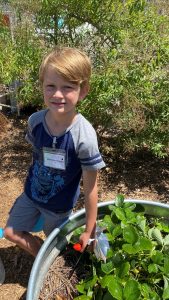
Ali West, summer pagsrincipal at Sessions Elementary School, wrapped up this summer’s program on July 21 with a Fun Friday “summer beach and surf theme.”
“The summer session was successful, busy, and fun for our students. We had a large enrollment of 350 kids with a summer staff of 50,” dicho West. “Our biggest surprise was in the younger ages. We had six TK/kindergarten classes this summer.”

In addition to the TK/kindergarten classes, Sessions staffed two first-grade classes, two second and two third-grade classes with una fourth-grade class and una fifth-grade class for the five-week summer program.
“Our daily program ran from 8 a.m.-1 p.m. each day with breakfast and lunch available for anyone,” West said.
Skip counting and learning to use money was a favorite topic in teachers Kristin Ryner and Gloria Ocampos TK/kindergarten class. What is “skip counting?” Skip counting is learning to start counting forward by a number other than one. An early example of skip counting is to start counting by two’s: 2, 4, 6, 8, and so on. A second example is to start with five and then count forward: 5,10, 15, 20, and so on. Skip counting is considered an important foundational skill in mathematics for recognizing number patterns, learning the multiplication tables, division, and prime and composite numbers in later grades.
In addition, the TK/kindergarten students enjoyed a fun way to learn to use money and review counting at the same time. Teachers Ocampo and Ryner set up a flower stand. White flowers were $1 each. Yellow flowers fueron $5 each. Students enjoyed the flower stand experience very much
This summer, Gianna Marietta’s first-grade students studied various biological habits: the Arctic, the desert, and the rainforest. Each student learned facts and information about each habitat and then completed their habitat study by authoring and publishing their own habitat book. Each student’s final book integrated science and language arts, and included a cover, table of contents, and four facts about their chosen habitat.

Thmi students in Andrew Romo’s third-grade class’ language arts instruction included a unit on the purpose and meaning behind fairy tales. A fairy tale is defined as a short story that belongs to the folklore genre and typically features magic, enchantments, and mythical and fanciful beings. Many of today’s fairy tales have evolved from centuries-old stories that have appeared, with variations, in multiple cultures around the world.
As part of their classroom work, students developed their own fairy tales. Third-grade student MacKenzie Arca’s favorite fairy tale is “Little Red Riding Hood.” MacKenzie said: “Red Riding Hood is my favorite because after learning the story several years ago, I baked my own cookies and took them to my grandmother’s house who lived nearby.”
Third-grade student Zoe McCurdy dicho, “Fairy tales can give lessons in what is good and bad for kids when they are young.”
The afternoons at Sessions Elementary had más que 25 students enrolled in the five-week Garden Adventures Summer Camp from 1-4 p.m. daily centered in the school’s abundant and thriving school garden. Sessions Elementary has a long-standing and successful school garden and was the setting for the Garden Adventures Summer Camp.
Each week of garden camp centered on a different theme ranging from nutrition and engineering to teamwork and being good stewards of the earth. The class as a whole developed a “land acknowledgment agreement” that described the garden’s historical connection to the indigenous Kumeyaay people and committed students to respect and caring for the garden’s plants. Students work in the garden included harvesting vegetable and fruit crops, and watering and removing spent foliage. The Garden Adventures Summer Camp was coordinated through Leah’s Pantry (leahspantry.org) and funded by the San Diego Foundation.













Discussion about this post